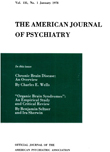THE CATECHOLAMINE HYPOTHESIS OF AFFECTIVE DISORDERS: A REVIEW OF SUPPORTING EVIDENCE
Abstract
The "catecholamine hypothesis of affective disorders" proposes that some, if not all, depressions are associated with an absolute or relative decrease in catecholamines, particularly norepinephrine, available at central adrenergic receptor sites. Elation, conversely, may be associated with an excess of such amines. Evidence supporting this hypothesis was reviewed.
Data from pharmacological studies, mainly in animals, suggest that the actions of both major classes of antidepressant drugs are mediated through the catecholamines. The monoamine oxidase inhibitors increase brain concentrations of norepinephrine while imipramine-like agents potentiate the physiological effects of norepinephrine. Reserpine, a drug which can cause clinical depression, depletes catecholamines, but other amines may also be involved in its mechanism of action. A rigorous extrapolation from pharmacological studies to pathophysiology clearly cannot be made. Clinical studies relevant to the catecholamime hypothesis are limited and the findings are inconclusive.
It is not possible, therefore, to confirm definitively or to reject the catecholamine hypothesis on the basis of data currently available. In our present state of knowledge, however, the catecholamine hypothesis is of considerable heuristic value, providing the investigator and the clinician with a frame of reference integrating much of our experience with those pharmacological agents which produce alterations in human affective states.
Access content
To read the fulltext, please use one of the options below to sign in or purchase access.- Personal login
- Institutional Login
- Sign in via OpenAthens
- Register for access
-
Please login/register if you wish to pair your device and check access availability.
Not a subscriber?
PsychiatryOnline subscription options offer access to the DSM-5 library, books, journals, CME, and patient resources. This all-in-one virtual library provides psychiatrists and mental health professionals with key resources for diagnosis, treatment, research, and professional development.
Need more help? PsychiatryOnline Customer Service may be reached by emailing [email protected] or by calling 800-368-5777 (in the U.S.) or 703-907-7322 (outside the U.S.).



